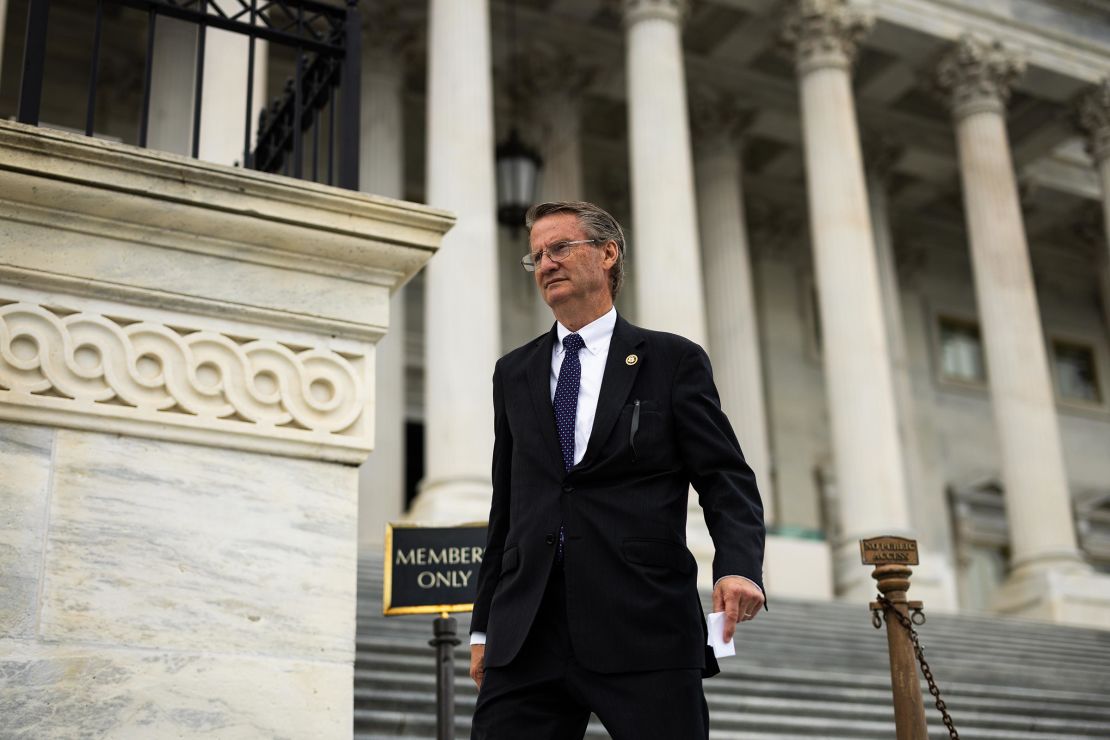For more on House Republicans’ debate on President-elect Donald Trump’s agenda, watch CNN’s “Inside Politics with Manu Raju” on Sunday at 8 a.m. ET and 11 a.m. ET.
Rep. Tim Burchett has never voted to increase the US borrowing limit in his life. And that might not change just because Donald Trump is the one to ask for his vote.
“I don’t know that I ever will,” Burchett told CNN when asked if he could support Trump’s plans for a debt limit hike.
Burchett, along with several other GOP hardliners, are drawing a clear red line when it comes to Trump’s first big policy package. They say the measure — which is expected to include a raise in the nation’s debt limit in addition to billions of dollars in spending on border security, energy projects and tax extensions — must be fully paid for, and not with accounting gimmicks that even Republicans have used in the past.
“You have to show me some reductions in spending. Some real reductions in spending. Not this stuff, ‘Oh we’re going to do this.’” Burchett said, dismissing past GOP attempts at budget reform that ultimately fizzle out.
Burchett is among multiple House and Senate conservatives who told CNN they are demanding hundreds of billions — or even trillions — in spending cuts in order to support Trump’s plan. Yet if they get their wish, it’s bound to cause a revolt among other quarters in the GOP, namely among Republican moderates and appropriators who have long protected certain cherished domestic programs. And that could cause the whole effort to collapse.

“The more things we pile onto a reconciliation package the bigger the invitation for opposition,” said Rep. Steve Womack, a senior appropriator and Republican of Arkansas. “And I am concerned about that.”
It all underscores the enormous challenge Trump faces in piecing together a coalition behind what he calls “one beautiful bill” — as party leaders navigate internal divisions over a complex suite of policies that House Speaker Mike Johnson has vowed to bring to the floor by April even though he’ll need near unanimous support within his conference to win passage. The chairman of the House Budget Committee is now preparing a list of $5 trillion worth of potential spending cuts in order to win over his conference, according to sources involved in the effort.
Yet Republicans say the fiscal fights are bound to be among the hardest to resolve.
“I’ve never voted for a debt ceiling increase before, and I would like to make sure that we’re paying for that,” said Rep. Andy Biggs, an Arizona Republican and member of the House Freedom Caucus.
Rep. Eli Crane, a Republican of Arizona, said he “most likely” would have major demands in exchange for including the debt limit.
Asked how he felt about Trump’s push to raise the national borrowing limit as part of the plan, Crane said: “I’ve got no comment.”
While no member is rejecting Trump’s agenda outright, they are signaling they are willing to dig in against any bill that doesn’t include steep — and immediate — cuts to pay for the entirety of the plan, plus paying down some of the national debt. If the government funding fight from December, where 38 Republicans voted against the bill that included the debt hike Trump wanted, is any indication, Trump merely calling on lawmakers to support it again might not be enough.
The president-elect, for instance, personally influenced Johnson’s last attempt to raise the debt limit. And that sentiment hasn’t changed among many conservatives.
“Bad idea,” Sen. Rand Paul, a Kentucky Republican, told CNN when asked about including a debt-limit hike in the broader package.
Yet the borrowing limit will need to be raised sometime this year to avoid the first-ever debt default, a potential economic calamity Trump is so eager to avoid that he made a last-ditch push to raise it in December that nearly spurred a government shutdown ahead of Christmas. Johnson was ultimately forced to punt on the debt limit and now plans to include the plan in the massive Trump bill.
Since they are using a budget process that can’t be filibustered under the rules in the Senate, Johnson argues that they can raise the debt limit on their own terms – meaning they won’t need Democratic buy-in to pass the bill.
But that means they’ll need to keep their own party in line.
Senior Republicans see the early warnings from the right as an ominous sign for a massive bill that must win support from all but a single Republican in the House. And some privately believe it may be impossible to pass any debt limit hike without help from Democrats.
Asked about fellow Republican gripes over the debt limit, senior Rep. Frank Lucas of Oklahoma said there are members who “never will” support it.
“That’s occasionally been a problem here — matching idealism with reality,” Lucas said. “And many of my friends who have never voted for a debt limit issue have voted for every increase in defense spending, every increase in infrastructure.”
Mar-a-Lago mindmeld
Trump and GOP leaders are working aggressively to win over these conservatives on the early stages of the bill. The president-elect hosted members of the ultraconservative Freedom Caucus at Mar-a-Lago this weekend.
But some conservatives say they aren’t entirely satisfied with what they’re hearing so far. Rep. Keith Self, a Republican from Texas who initially opposed Johnson as speaker on January 3, told CNN he is concerned that “spending was not well addressed” in a recent policy session with House GOP leaders.
“Reconciliation is about controlling spending on the mandatory side,” Self said, referring to the budget process used to circumvent the filibuster. “We need to make sure we’re doing that.”
The budgetary math, though, is difficult as Johnson and others have ruled out any cuts to costly programs like Medicare and Social Security.
“Look, the president(-elect) has made it very clear. Social Security and Medicare have to be preserved and we are not, no one is coming in with the intention of cutting benefits in any way or anything,” Johnson told reporters.

Instead, Republicans are discussing ways to trim spending from programs like Medicaid or nutritional programs by instituting work requirements. There are easy GOP targets, like recouping the costs of Biden’s attempt to forgive student loan debt or his new federal support for electric vehicles, which Republicans believe could save at least $100 billion.
But that’s unlikely to cover the whole price tag. One GOP aide described it as taking a “scalpel into a mine to look for ore.” And any decision to slash spending risks losing more GOP voters.
“We’ve got 20 or 25 different complex issues,” said Rep. Chip Roy of Texas, a stalwart fiscal hawk. His biggest single priority is making sure the bill doesn’t cost more money — real savings and “not bull crap, made up” cuts.
Asked if he would buckle to pressure from Trump to raise the debt limit, Roy told CNN: “I fully support clearing the decks on the debt ceiling … But I’m not going to back off my belief that we need to drive deficits down.”
Most members heading down to Mar-a-Lago say they will be in listening mode, hoping that Trump will present them with ideas they can get behind.
“It’s having those lines of communication, which I think are really important,” GOP Rep. Byron Donalds, who met with Trump on Friday night, told CNN.
The GOP pressure campaign begins
Conservatives in Congress say they will insist that the full package — including any extension of Trump’s 2017 tax cuts — are fully paid for, unlike the first time around.
“Republicans want to return to fiscal responsibility that has been lost over the last several years under leadership from both parties,” said Rep. Ben Cline, a member of the Freedom Caucus and GOP budget committee.
But that dynamic gets trickier as GOP leaders consider adding even more tax breaks. Johnson is under intense pressure by a small group of New York Republicans to restore a costly state and local tax benefit that their party restricted in 2017.
Cline said bringing back the more generous deduction, known as SALT, could cost as much as a trillion dollars.
“Are those savings achievable? Is this conference willing to seek them out and include them? That is something we have to talk about,” Cline said, when asked about the tax deductions.

But that group of Republicans, representing swing districts in New York, New Jersey and California, will also meet with Trump this weekend as some of those members say restoring the SALT tax break is their own red line.
“Look, I’ve been very clear,” said Rep. Mike Lawler, a New York Republican meeting with Trump at Mar-a-Lago this weekend. “I will not support a tax bill that does not lift the cap on SALT.”
Rep. Ralph Norman, another Freedom Caucus member, believes Trump will ultimately help keep the GOP in line behind his bill. He pointed to a phone call from Trump last week during the speaker election, when Trump helped convince him to give Johnson a full term as speaker.
“He will call 100 people if it takes that, just like he did with me. I want a president, who can tell us directly, ‘This is why I need it, and, what’s it going to take to get you on board?’” Norman said.
CNN’s Annie Grayer and Ali Main contributed to this report.






